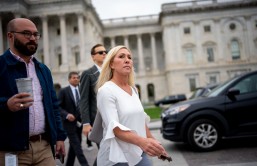The Obama administration is pushing to reach an international agreement on climate change that would compel nations to limit carbon emissions, a move that sidesteps Congress and is sure to add fuel to the political fire Republicans have set against the president.
The administration hopes to join a U.N. treaty next year that would bind countries into reducing fossil fuel emissions by a certain amount, The New York Times reported. But officials say there is no way a Republican-controlled Senate will pass the treaty with a two-thirds majority vote, as required by the U.S. Constitution.
As a result, President Obama's climate-change negotiators have come up with a loophole. Parts of another treaty from 1992 would be altered with new elements, thus resulting in an updated treaty that doesn't require a vote from Congress.
"There's some legal and political magic to this," Jake Schmidt, a climate-change negotiator from the advocacy group National Resources Defense Council, told the Times. "They're trying to move this as far as possible without having to reach the 67-vote threshold."
Countries that sign would be legally required to enforce climate-change laws but would be allowed to voluntarily set certain levels of emissions cuts.
Republicans, already skeptical about the existence of man-made climate change, are set to call the administration out on another alleged breach of power.
"Unfortunately, this would be just another of many examples of the Obama administration's tendency to abide by laws that it likes and to disregard laws it doesn't like - and to ignore the elected representatives of the people when they don't agree," said Republican Sen. Mitch McConnell.
Republicans may not buy into climate change, but scientists say the Earth is seeing the drastic effects of man-made global warming, including harsh droughts like the one in California and wildfires that have ravaged the West Coast.
Other nations have already lauded the push for an international agreement, without which "it's impossible for us to address the threats of climate change," Richard Muyungi, a climate negotiator for Tanzania, told the Times.
"We are not as capable as the U.S. of facing this problem...What we need is just one thing: Let the U.S. ratify the agreement," he added.








